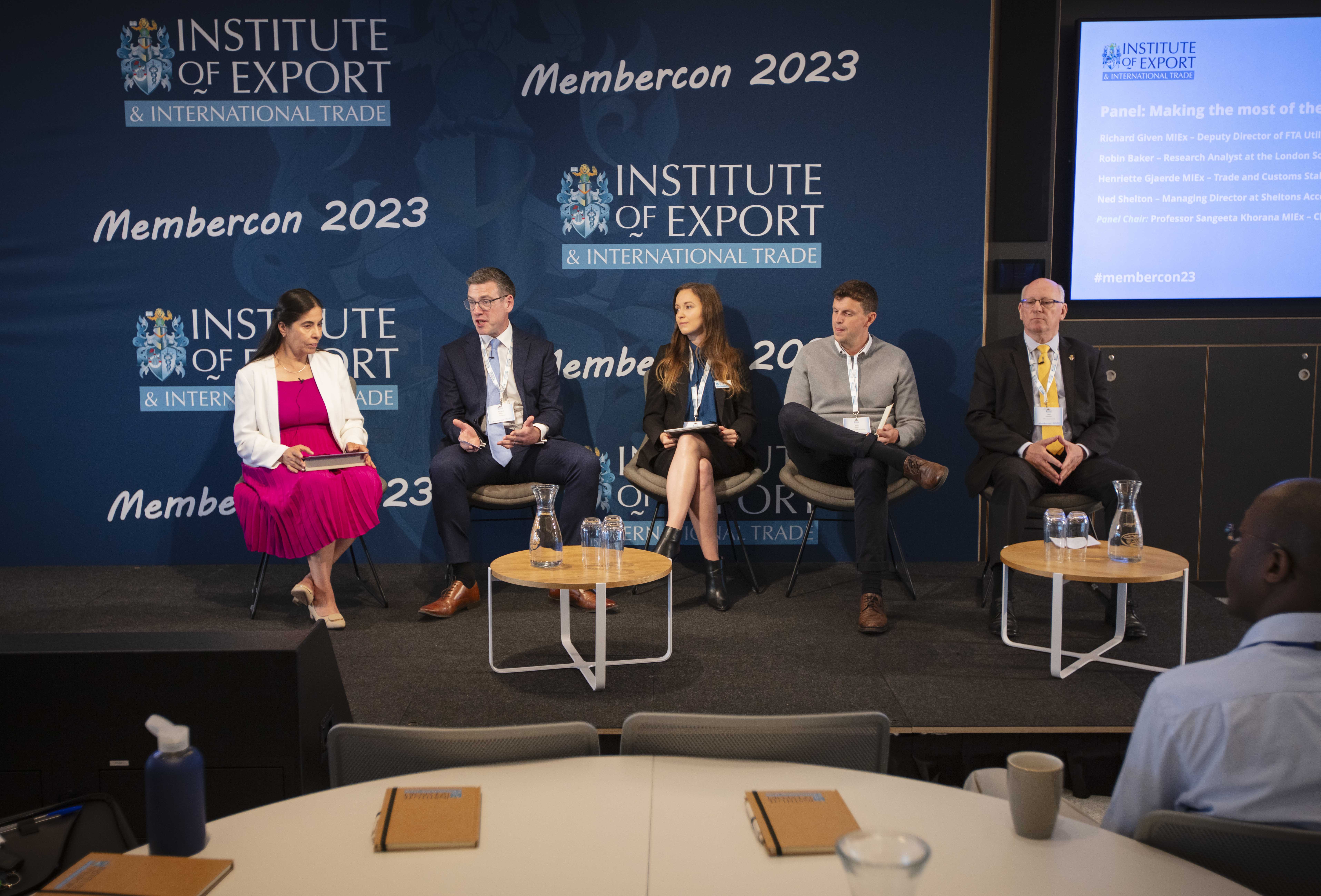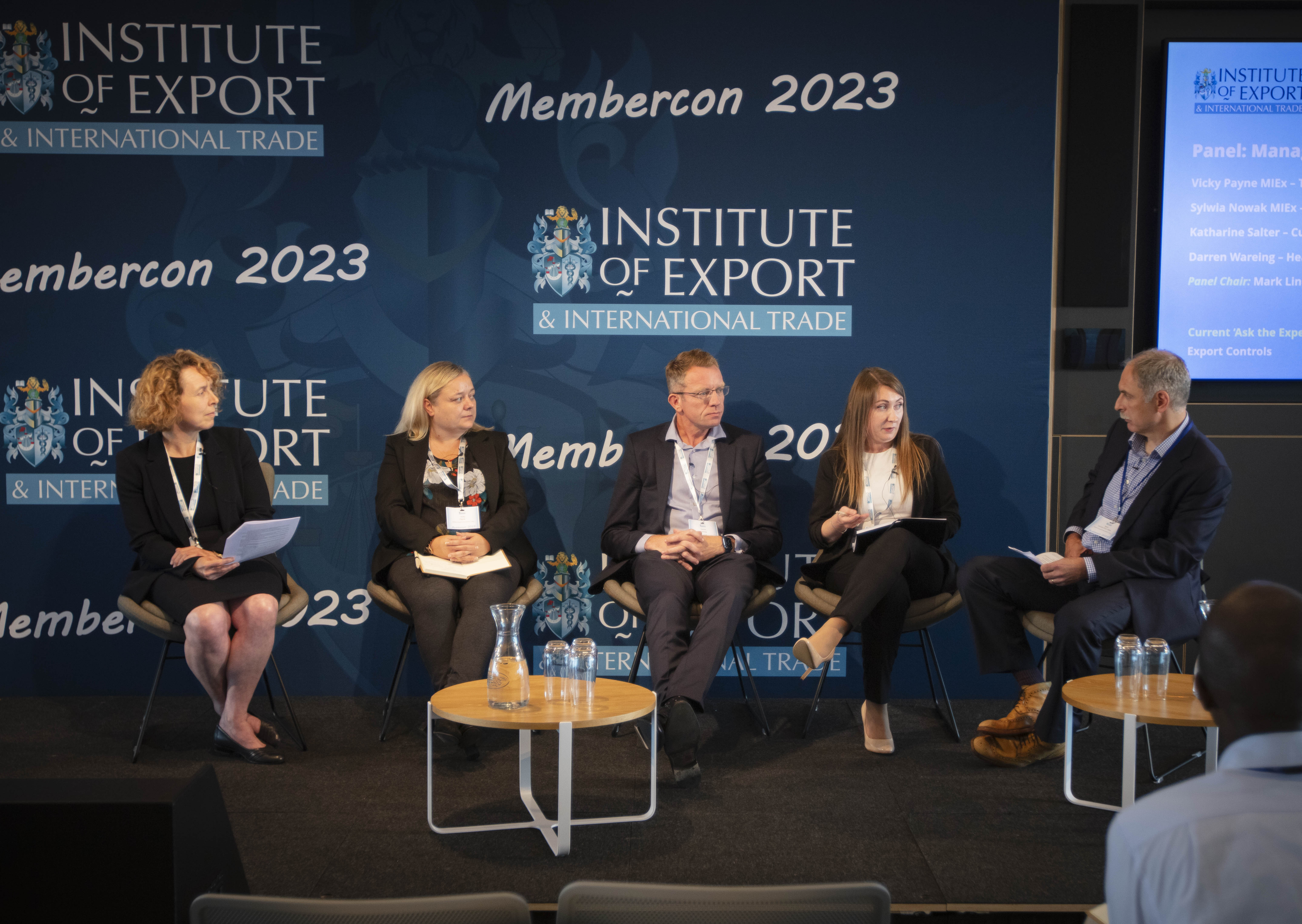
Members of the Institute of Export & International Trade (IOE&IT) and leaders from across the wider global trade community gathered in Liverpool today (5 July) for IOE&IT’s annual MemberCon event.
With a strapline of ‘Getting trade moving’, the day’s focus was on delivering practical, implementable tips and advice to traders to help them expand and grow.
UK FTAs
Having heard earlier in the morning from Lord Offord, minister for exports, about the importance of government and businesses working closely in partnership to boost UK trade and exports, the theme was raised again in panel discussions.
One of the ways the Department for Business and Trade (DBT) is seeking to get trade moving is by helping businesses to make the most of the UK’s post-Brexit free trade agreements (FTAs) and other trade deals. This was the focus of the day’s first discussion panel, chaired by Professor Sangeeta Khorana MIEx, trustee director and chair of the IOE&IT’s Academic Board.
Also on the panel were Richard Given MIEx, deputy director for FTA utilisation at DBT , Robin Baker, associate researcher at the London School of Economics, Ned Shelton, managing director at Sheltons Accountants, and Henriette Gjaerde, a trade and customs stakeholder relationship specialist at IOE&IT.
Professor Khorana noted that the UK has over 70 trade deals in place, including those it rolled over from the EU and new agreements with Australia and New Zealand. She added that negotiations are ongoing with countries including India, Switzerland and Canada.
The UK has also reached agreement to join the Comprehensive and Progressive Trans-Pacific Partnership (CPTPP), but none of these will do much for the UK or trade generally unless businesses engage with and utilise them.
Making the most of FTAs
“It’s good to have the buzz of doing FTAs, but if they are not utilised they remain just a piece of paper,” said Professor Khorana. The key question for the panel, and the trade community, was how to get businesses to use trade deals.
Given explained that awareness of new and existing FTAs remains too low among the business community. He pointed to research showing that among exporting businesses only 33% knew whether preferential tariffs apply or not. He admitted that FTAs are long, complex legal documents.
“Trade agreements are complex and no one in a business will have read it all. But they are important because they set the ground rules for trade,” he said. He added that traders only needed to “understand the basic anatomy of the deal” in order to make the most of it.
Given added that there is plenty of documentation and support available for businesses who want to export and that includes support explaining the relevant parts of new FTAs sector by sector.
“One solution to the awareness issue is to focus on those parts [of the FTA] that make the most difference to the most companies,” he said.
Awareness
Baker added that research from LSE into utilisation of a recent UK-Japan trade deal showed that lack of awareness of the benefits was indeed a major factor. But he added that there was also evidence that utilisation is closely related to the “preference margin” – in other words the benefit of lower tariffs after any added compliance costs have been factored in.
“The higher that margin, the greater utilisation,” said Baker. So working to simply and remove regulatory burdens would be another way to boost take-up.
Australia learnings
As a trade expert with a business that operates globally but is heavily focused in the UK and Australia, Shelton – having got in several digs about the cricket – focused on benefits from the recent UK-Australia FTA beyond just preferential tariffs.
He pointed in particular to the increased mobility of people between the two countries with working visa schemes being extended. He added that the UK would get better at understanding the compromises that are an essential part of the trade negotiation process.
“One thing Australia has done well is that we have accepted the idea of the need for compromise. You have to give in order to get deals done. It will come, as the UK becomes more experienced in negotiating trade deals.”
Cultural differences
Gjaerde added that it was also vital for businesses looking to trade internationally to be aware of cultural differences between their home market and overseas markets. But she added that this should be part of a wider research process that all businesses should undertake before expanding globally:
“Know the market you are going to and where your business fits in to that market. Know if there is a place for you in the new market. Do your research, don’t only read the FTA. Talk to other businesses that are already established in that market.”
This call to turn to other businesses as a means of information and support was echoed across the panel.
Professor Khorana agreed that there was a wealth of information available for businesses beyond government websites, with other businesses being potential sources of knowledge that able to offer insights into their success stories and the challenges they have overcome.
This partnership approach was confirmed Given and central to DBT’s intended approach towards achieving greater awareness and utilisation of FTAs. He added that over time he wants to build stronger links to other trade organisations and bodies able to help businesses export more.
Managing the costs of trade
Another major concern for members and other business leaders, as inflation continues to remain stubbornly high, is the sheer cost of doing business internationally. On a panel focused on managing the cost of doing business internationally, delegates were urged to consider the financial cost of non-compliance.
Chaired by Mark Lincoln, business transformation leader and IOE&IT board member, the panel included Vicky Payne, director of the IOE&IT Academy, Darren Wareing, head of sales, Core UK, Sylwia Nowak, senior customs and foreign trade compliance officer at Brose Group, and Katharine Salter, head of AEO and customs authorisations at HMRC.
Payne kicked off the panel with an exhortation to train, qualify and educate individuals across the business so they understood, not only the general principles and wider compliance landscape, but also the latest developments and updates in trade and customs.
She urged business leaders and executives to not make compliance a side issue:
“Training and knowledge, upskilling your teams can help the whole business better understand what they are doing. Look to keeping updated and then, where it’s needed, seek out the relevant deep knowledge.”
She said that it was vital this went across the entire organisation and that compliance was seen as core to the business and not something on the sidelines .
Compliance an investment
Salter concurred that the cost of getting things wrong from a compliance perspective outweighed any investment in training and understanding to get it right first time. She said that HMRC was looking to do all it could to not only simplify processes and procedures, but also to consult with business to make sure that future policy changes led to systems that helped businesses.
Pointing to current consultations on temporary admissions, the future of customs declarations and intermediaries, Salter added that HMRC was looking to put more guidance online.
“We are looking to provide more technical guidance in customs,” she said. “Some of this is tricky but getting it wrong is so expensive. We’d rather everyone gets it right.”
Brexit rules and added complexity
Novak explained that while Brexit had undoubtedly added new costs and layers of complexity to EU trade. Her company like many others had adapted and adjusted to the new way of working.
She said that things like the switch to CDS for imports – with CDS for exports coming later this year – meant that traders and customs staff had to be “on their toes” to stay compliant, but that utilising FTAs compliantly was the most cost-effective way of trading.
Supply chain digitalisation
Wareing added that technology has a major role to play and that there are advantages in using newer systems that allow for cleaner data to be tracked right through a supply chain.
He highlighted the example of a UK retailer who got it wrong and ended with a shipment stuck at US customs for three weeks, incurring huge extra cost and damaging reputation.
In short, awareness of the regulatory environment and a deep understanding of the customs rules that apply can help to reduce the cost of trade by getting things right first time.
The use of data and technology can enhance this – easing compliance costs and simplifying processes – and this will be amplified as more governments, including the UK, introduce more systems such as trusted trader schemes and the single trade window.




